Simulation Software
Simulation Equipment
Simulation Models
Surgical Simulation
Patient Simulation
Procedural Simulation
Virtual Reality Simulation
Hospitals
Academic Institutions
Military Organizations
Healthcare Providers
High-Fidelity Simulation
Low-Fidelity Simulation
Virtual Simulation
North America
Europe
South America
Asia Pacific
Middle East and Africa
North America Outlook (USD Billion, 2019-2035)
Medical Simulation Market by Type
Simulation Software
Simulation Equipment
Simulation Models
Medical Simulation Market by Application Type
Surgical Simulation
Patient Simulation
Procedural Simulation
Virtual Reality Simulation
Medical Simulation Market by End Use Type
Hospitals
Academic Institutions
Military Organizations
Healthcare Providers
Medical Simulation Market by Technology Type
High-Fidelity Simulation
Low-Fidelity Simulation
Virtual Simulation
Medical Simulation Market by Regional Type
US
Canada
US Outlook (USD Billion, 2019-2035)
Medical Simulation Market by Type
Simulation Software
Simulation Equipment
Simulation Models
Medical Simulation Market by Application Type
Surgical Simulation
Patient Simulation
Procedural Simulation
Virtual Reality Simulation
Medical Simulation Market by End Use Type
Hospitals
Academic Institutions
Military Organizations
Healthcare Providers
Medical Simulation Market by Technology Type
High-Fidelity Simulation
Low-Fidelity Simulation
Virtual Simulation
CANADA Outlook (USD Billion, 2019-2035)
Medical Simulation Market by Type
Simulation Software
Simulation Equipment
Simulation Models
Medical Simulation Market by Application Type
Surgical Simulation
Patient Simulation
Procedural Simulation
Virtual Reality Simulation
Medical Simulation Market by End Use Type
Hospitals
Academic Institutions
Military Organizations
Healthcare Providers
Medical Simulation Market by Technology Type
High-Fidelity Simulation
Low-Fidelity Simulation
Virtual Simulation
Europe Outlook (USD Billion, 2019-2035)
Medical Simulation Market by Type
Simulation Software
Simulation Equipment
Simulation Models
Medical Simulation Market by Application Type
Surgical Simulation
Patient Simulation
Procedural Simulation
Virtual Reality Simulation
Medical Simulation Market by End Use Type
Hospitals
Academic Institutions
Military Organizations
Healthcare Providers
Medical Simulation Market by Technology Type
High-Fidelity Simulation
Low-Fidelity Simulation
Virtual Simulation
Medical Simulation Market by Regional Type
Germany
UK
France
Russia
Italy
Spain
Rest of Europe
GERMANY Outlook (USD Billion, 2019-2035)
Medical Simulation Market by Type
Simulation Software
Simulation Equipment
Simulation Models
Medical Simulation Market by Application Type
Surgical Simulation
Patient Simulation
Procedural Simulation
Virtual Reality Simulation
Medical Simulation Market by End Use Type
Hospitals
Academic Institutions
Military Organizations
Healthcare Providers
Medical Simulation Market by Technology Type
High-Fidelity Simulation
Low-Fidelity Simulation
Virtual Simulation
UK Outlook (USD Billion, 2019-2035)
Medical Simulation Market by Type
Simulation Software
Simulation Equipment
Simulation Models
Medical Simulation Market by Application Type
Surgical Simulation
Patient Simulation
Procedural Simulation
Virtual Reality Simulation
Medical Simulation Market by End Use Type
Hospitals
Academic Institutions
Military Organizations
Healthcare Providers
Medical Simulation Market by Technology Type
High-Fidelity Simulation
Low-Fidelity Simulation
Virtual Simulation
FRANCE Outlook (USD Billion, 2019-2035)
Medical Simulation Market by Type
Simulation Software
Simulation Equipment
Simulation Models
Medical Simulation Market by Application Type
Surgical Simulation
Patient Simulation
Procedural Simulation
Virtual Reality Simulation
Medical Simulation Market by End Use Type
Hospitals
Academic Institutions
Military Organizations
Healthcare Providers
Medical Simulation Market by Technology Type
High-Fidelity Simulation
Low-Fidelity Simulation
Virtual Simulation
RUSSIA Outlook (USD Billion, 2019-2035)
Medical Simulation Market by Type
Simulation Software
Simulation Equipment
Simulation Models
Medical Simulation Market by Application Type
Surgical Simulation
Patient Simulation
Procedural Simulation
Virtual Reality Simulation
Medical Simulation Market by End Use Type
Hospitals
Academic Institutions
Military Organizations
Healthcare Providers
Medical Simulation Market by Technology Type
High-Fidelity Simulation
Low-Fidelity Simulation
Virtual Simulation
ITALY Outlook (USD Billion, 2019-2035)
Medical Simulation Market by Type
Simulation Software
Simulation Equipment
Simulation Models
Medical Simulation Market by Application Type
Surgical Simulation
Patient Simulation
Procedural Simulation
Virtual Reality Simulation
Medical Simulation Market by End Use Type
Hospitals
Academic Institutions
Military Organizations
Healthcare Providers
Medical Simulation Market by Technology Type
High-Fidelity Simulation
Low-Fidelity Simulation
Virtual Simulation
SPAIN Outlook (USD Billion, 2019-2035)
Medical Simulation Market by Type
Simulation Software
Simulation Equipment
Simulation Models
Medical Simulation Market by Application Type
Surgical Simulation
Patient Simulation
Procedural Simulation
Virtual Reality Simulation
Medical Simulation Market by End Use Type
Hospitals
Academic Institutions
Military Organizations
Healthcare Providers
Medical Simulation Market by Technology Type
High-Fidelity Simulation
Low-Fidelity Simulation
Virtual Simulation
REST OF EUROPE Outlook (USD Billion, 2019-2035)
Medical Simulation Market by Type
Simulation Software
Simulation Equipment
Simulation Models
Medical Simulation Market by Application Type
Surgical Simulation
Patient Simulation
Procedural Simulation
Virtual Reality Simulation
Medical Simulation Market by End Use Type
Hospitals
Academic Institutions
Military Organizations
Healthcare Providers
Medical Simulation Market by Technology Type
High-Fidelity Simulation
Low-Fidelity Simulation
Virtual Simulation
APAC Outlook (USD Billion, 2019-2035)
Medical Simulation Market by Type
Simulation Software
Simulation Equipment
Simulation Models
Medical Simulation Market by Application Type
Surgical Simulation
Patient Simulation
Procedural Simulation
Virtual Reality Simulation
Medical Simulation Market by End Use Type
Hospitals
Academic Institutions
Military Organizations
Healthcare Providers
Medical Simulation Market by Technology Type
High-Fidelity Simulation
Low-Fidelity Simulation
Virtual Simulation
Medical Simulation Market by Regional Type
China
India
Japan
South Korea
Malaysia
Thailand
Indonesia
Rest of APAC
CHINA Outlook (USD Billion, 2019-2035)
Medical Simulation Market by Type
Simulation Software
Simulation Equipment
Simulation Models
Medical Simulation Market by Application Type
Surgical Simulation
Patient Simulation
Procedural Simulation
Virtual Reality Simulation
Medical Simulation Market by End Use Type
Hospitals
Academic Institutions
Military Organizations
Healthcare Providers
Medical Simulation Market by Technology Type
High-Fidelity Simulation
Low-Fidelity Simulation
Virtual Simulation
INDIA Outlook (USD Billion, 2019-2035)
Medical Simulation Market by Type
Simulation Software
Simulation Equipment
Simulation Models
Medical Simulation Market by Application Type
Surgical Simulation
Patient Simulation
Procedural Simulation
Virtual Reality Simulation
Medical Simulation Market by End Use Type
Hospitals
Academic Institutions
Military Organizations
Healthcare Providers
Medical Simulation Market by Technology Type
High-Fidelity Simulation
Low-Fidelity Simulation
Virtual Simulation
JAPAN Outlook (USD Billion, 2019-2035)
Medical Simulation Market by Type
Simulation Software
Simulation Equipment
Simulation Models
Medical Simulation Market by Application Type
Surgical Simulation
Patient Simulation
Procedural Simulation
Virtual Reality Simulation
Medical Simulation Market by End Use Type
Hospitals
Academic Institutions
Military Organizations
Healthcare Providers
Medical Simulation Market by Technology Type
High-Fidelity Simulation
Low-Fidelity Simulation
Virtual Simulation
SOUTH KOREA Outlook (USD Billion, 2019-2035)
Medical Simulation Market by Type
Simulation Software
Simulation Equipment
Simulation Models
Medical Simulation Market by Application Type
Surgical Simulation
Patient Simulation
Procedural Simulation
Virtual Reality Simulation
Medical Simulation Market by End Use Type
Hospitals
Academic Institutions
Military Organizations
Healthcare Providers
Medical Simulation Market by Technology Type
High-Fidelity Simulation
Low-Fidelity Simulation
Virtual Simulation
MALAYSIA Outlook (USD Billion, 2019-2035)
Medical Simulation Market by Type
Simulation Software
Simulation Equipment
Simulation Models
Medical Simulation Market by Application Type
Surgical Simulation
Patient Simulation
Procedural Simulation
Virtual Reality Simulation
Medical Simulation Market by End Use Type
Hospitals
Academic Institutions
Military Organizations
Healthcare Providers
Medical Simulation Market by Technology Type
High-Fidelity Simulation
Low-Fidelity Simulation
Virtual Simulation
THAILAND Outlook (USD Billion, 2019-2035)
Medical Simulation Market by Type
Simulation Software
Simulation Equipment
Simulation Models
Medical Simulation Market by Application Type
Surgical Simulation
Patient Simulation
Procedural Simulation
Virtual Reality Simulation
Medical Simulation Market by End Use Type
Hospitals
Academic Institutions
Military Organizations
Healthcare Providers
Medical Simulation Market by Technology Type
High-Fidelity Simulation
Low-Fidelity Simulation
Virtual Simulation
INDONESIA Outlook (USD Billion, 2019-2035)
Medical Simulation Market by Type
Simulation Software
Simulation Equipment
Simulation Models
Medical Simulation Market by Application Type
Surgical Simulation
Patient Simulation
Procedural Simulation
Virtual Reality Simulation
Medical Simulation Market by End Use Type
Hospitals
Academic Institutions
Military Organizations
Healthcare Providers
Medical Simulation Market by Technology Type
High-Fidelity Simulation
Low-Fidelity Simulation
Virtual Simulation
REST OF APAC Outlook (USD Billion, 2019-2035)
Medical Simulation Market by Type
Simulation Software
Simulation Equipment
Simulation Models
Medical Simulation Market by Application Type
Surgical Simulation
Patient Simulation
Procedural Simulation
Virtual Reality Simulation
Medical Simulation Market by End Use Type
Hospitals
Academic Institutions
Military Organizations
Healthcare Providers
Medical Simulation Market by Technology Type
High-Fidelity Simulation
Low-Fidelity Simulation
Virtual Simulation
South America Outlook (USD Billion, 2019-2035)
Medical Simulation Market by Type
Simulation Software
Simulation Equipment
Simulation Models
Medical Simulation Market by Application Type
Surgical Simulation
Patient Simulation
Procedural Simulation
Virtual Reality Simulation
Medical Simulation Market by End Use Type
Hospitals
Academic Institutions
Military Organizations
Healthcare Providers
Medical Simulation Market by Technology Type
High-Fidelity Simulation
Low-Fidelity Simulation
Virtual Simulation
Medical Simulation Market by Regional Type
Brazil
Mexico
Argentina
Rest of South America
BRAZIL Outlook (USD Billion, 2019-2035)
Medical Simulation Market by Type
Simulation Software
Simulation Equipment
Simulation Models
Medical Simulation Market by Application Type
Surgical Simulation
Patient Simulation
Procedural Simulation
Virtual Reality Simulation
Medical Simulation Market by End Use Type
Hospitals
Academic Institutions
Military Organizations
Healthcare Providers
Medical Simulation Market by Technology Type
High-Fidelity Simulation
Low-Fidelity Simulation
Virtual Simulation
MEXICO Outlook (USD Billion, 2019-2035)
Medical Simulation Market by Type
Simulation Software
Simulation Equipment
Simulation Models
Medical Simulation Market by Application Type
Surgical Simulation
Patient Simulation
Procedural Simulation
Virtual Reality Simulation
Medical Simulation Market by End Use Type
Hospitals
Academic Institutions
Military Organizations
Healthcare Providers
Medical Simulation Market by Technology Type
High-Fidelity Simulation
Low-Fidelity Simulation
Virtual Simulation
ARGENTINA Outlook (USD Billion, 2019-2035)
Medical Simulation Market by Type
Simulation Software
Simulation Equipment
Simulation Models
Medical Simulation Market by Application Type
Surgical Simulation
Patient Simulation
Procedural Simulation
Virtual Reality Simulation
Medical Simulation Market by End Use Type
Hospitals
Academic Institutions
Military Organizations
Healthcare Providers
Medical Simulation Market by Technology Type
High-Fidelity Simulation
Low-Fidelity Simulation
Virtual Simulation
REST OF SOUTH AMERICA Outlook (USD Billion, 2019-2035)
Medical Simulation Market by Type
Simulation Software
Simulation Equipment
Simulation Models
Medical Simulation Market by Application Type
Surgical Simulation
Patient Simulation
Procedural Simulation
Virtual Reality Simulation
Medical Simulation Market by End Use Type
Hospitals
Academic Institutions
Military Organizations
Healthcare Providers
Medical Simulation Market by Technology Type
High-Fidelity Simulation
Low-Fidelity Simulation
Virtual Simulation
MEA Outlook (USD Billion, 2019-2035)
Medical Simulation Market by Type
Simulation Software
Simulation Equipment
Simulation Models
Medical Simulation Market by Application Type
Surgical Simulation
Patient Simulation
Procedural Simulation
Virtual Reality Simulation
Medical Simulation Market by End Use Type
Hospitals
Academic Institutions
Military Organizations
Healthcare Providers
Medical Simulation Market by Technology Type
High-Fidelity Simulation
Low-Fidelity Simulation
Virtual Simulation
Medical Simulation Market by Regional Type
GCC Countries
South Africa
Rest of MEA
GCC COUNTRIES Outlook (USD Billion, 2019-2035)
Medical Simulation Market by Type
Simulation Software
Simulation Equipment
Simulation Models
Medical Simulation Market by Application Type
Surgical Simulation
Patient Simulation
Procedural Simulation
Virtual Reality Simulation
Medical Simulation Market by End Use Type
Hospitals
Academic Institutions
Military Organizations
Healthcare Providers
Medical Simulation Market by Technology Type
High-Fidelity Simulation
Low-Fidelity Simulation
Virtual Simulation
SOUTH AFRICA Outlook (USD Billion, 2019-2035)
Medical Simulation Market by Type
Simulation Software
Simulation Equipment
Simulation Models
Medical Simulation Market by Application Type
Surgical Simulation
Patient Simulation
Procedural Simulation
Virtual Reality Simulation
Medical Simulation Market by End Use Type
Hospitals
Academic Institutions
Military Organizations
Healthcare Providers
Medical Simulation Market by Technology Type
High-Fidelity Simulation
Low-Fidelity Simulation
Virtual Simulation
REST OF MEA Outlook (USD Billion, 2019-2035)
Medical Simulation Market by Type
Simulation Software
Simulation Equipment
Simulation Models
Medical Simulation Market by Application Type
Surgical Simulation
Patient Simulation
Procedural Simulation
Virtual Reality Simulation
Medical Simulation Market by End Use Type
Hospitals
Academic Institutions
Military Organizations
Healthcare Providers
Medical Simulation Market by Technology Type
High-Fidelity Simulation
Low-Fidelity Simulation
Virtual Simulation


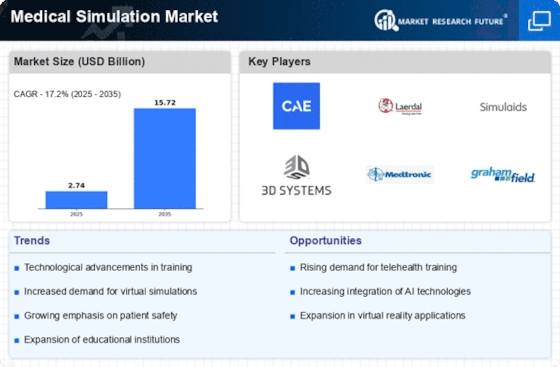
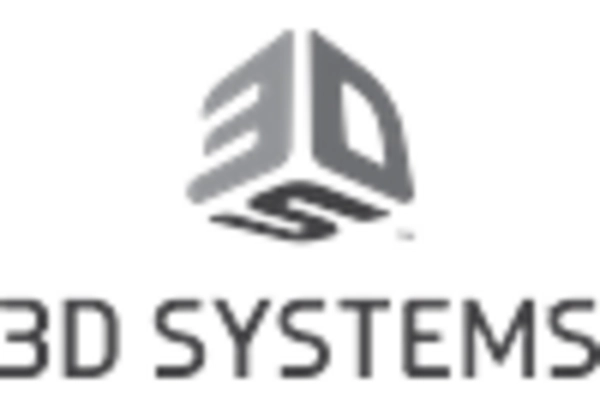
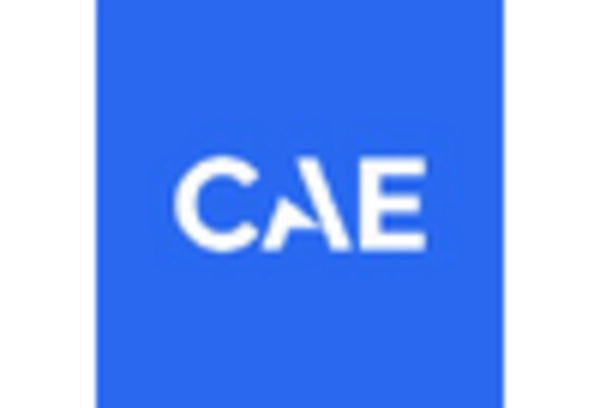
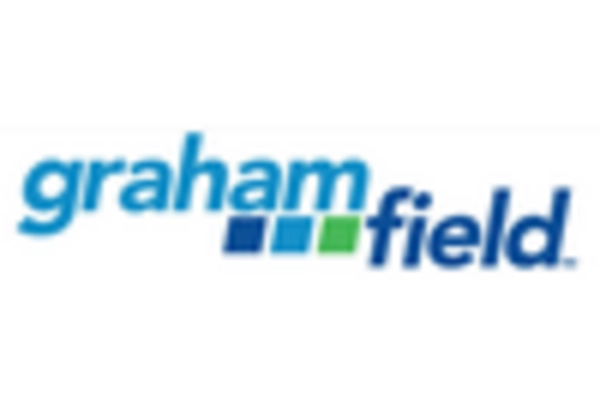
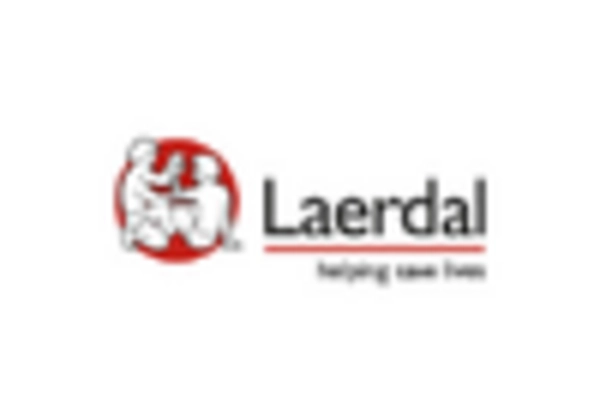

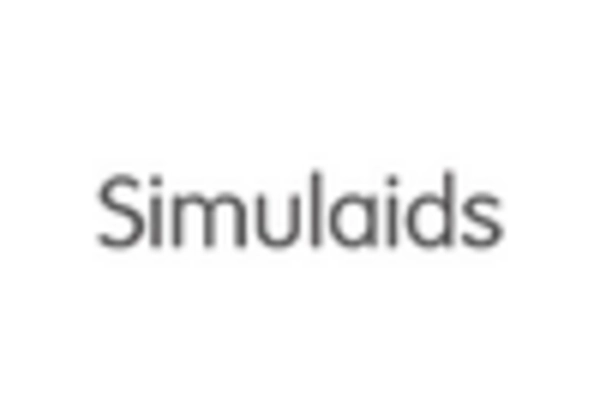









Leave a Comment